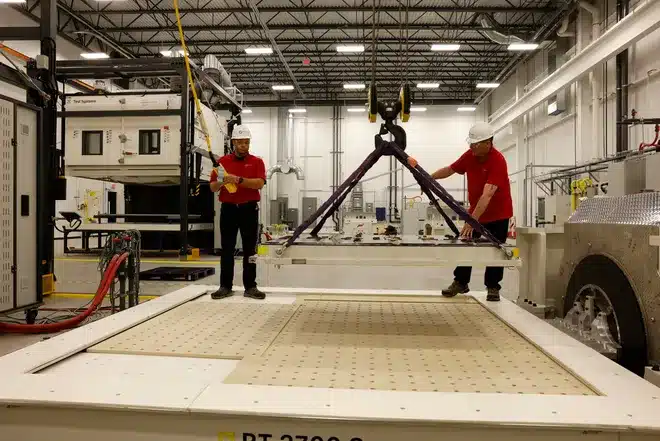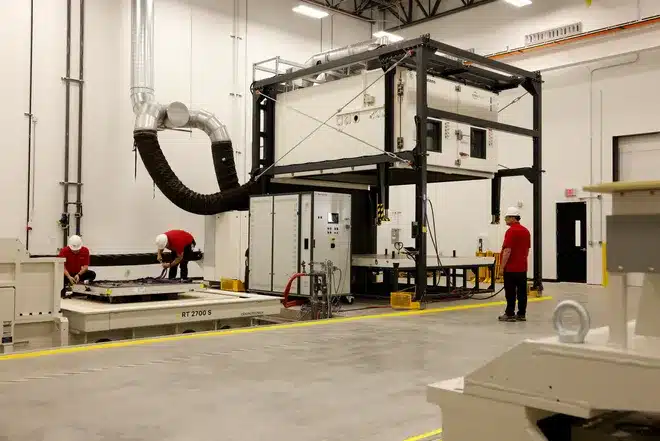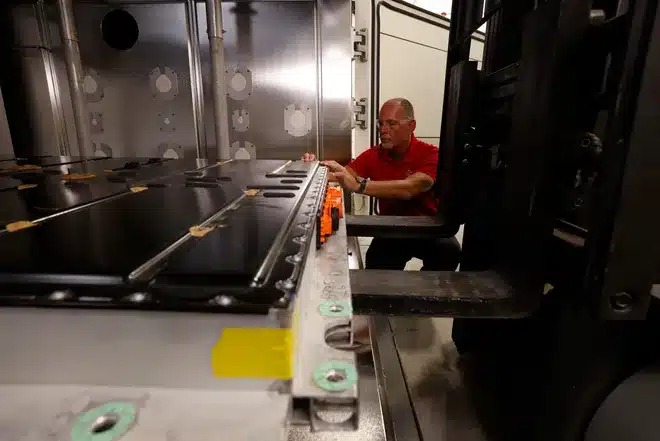North America’s Most Extensive EV Battery Testing Lab Opens in Michigan
A new $100-million lab opened August 7, 2024, in Auburn Hills, Michigan, marking a significant milestone in the field of electric vehicle (EV) testing. This state-of-the-art facility is designed to rigorously test EV batteries against a variety of stresses, from extreme temperatures to mechanical impacts, ensuring their safety and reliability.
Jennifer Scanlon, CEO of UL Solutions (formerly Underwriters Laboratories), highlighted that this investment is the largest single lab project in the company’s 130-year history. Spanning 90,000 square feet, the new lab aims to accelerate the development of new EV models by providing comprehensive and high-fidelity testing capabilities. This facility will play a crucial role in helping automakers bring their EVs to market faster while maintaining high safety standards.
By simulating real-world conditions and potential failure modes, the lab will help manufacturers address issues before they reach consumers, ultimately contributing to safer and more reliable electric vehicles.

Described as “North America’s most extensive battery-testing lab,” this new facility in Auburn Hills, Michigan, represents a pivotal expansion in a longstanding partnership between UL Solutions and Detroit automakers. This collaboration spans over 110 years, reflecting a deep-rooted commitment to advancing automotive safety and innovation.
Founded in 1894, Underwriters Laboratories (now UL Solutions) was established to address public concerns about the safety and reliability of emerging technologies, particularly electric power. Back then, electricity was a novel and uncertain technology, much like electric vehicles (EVs) are perceived by some today. UL’s mission was to provide assurance about these new technologies, starting with devices like incandescent light bulbs.
The iconic UL “safety Mark” quickly became a symbol of reliability and trust, becoming a standard requirement for appliances like toasters. This historic commitment to safety and innovation now continues with the new lab, which will play a critical role in ensuring the safety and performance of modern EV batteries, fostering greater confidence in this rapidly evolving technology.

By 1920, UL had certified the reliability of millions of auto parts, demonstrating its early and significant influence on automotive safety. The organization continued to evolve with the industry, certifying its first seat belt in 1963, a landmark in automotive safety innovation.
As federal motor vehicle safety standards (FMVSS) were introduced, the prominence of the UL seal diminished somewhat, as these standards became a mandatory benchmark for vehicle safety. Today, UL Solutions continues to play a crucial role in testing and certifying automotive parts and systems. Their work ensures compliance not only with FMVSS but also with international standards, automakers’ internal requirements, and various industry benchmarks. This comprehensive approach reflects UL’s ongoing commitment to advancing safety and reliability in the automotive sector, including the latest developments in electric vehicle technology.
The New Lab Will Test Batteries for a Wide Variety of Conditions
The new lab in Auburn Hills is set to conduct thorough and rigorous testing of EV batteries, addressing a wide range of potential stressors. The facility will evaluate batteries for various challenges, including:
- Fire Resistance: Ensuring that batteries can withstand and safely handle fire-related incidents.
- Water Exposure: Testing how batteries perform and remain safe when exposed to water.
- Stone Chips: Assessing the durability of batteries against impacts from debris and road hazards.
- External Temperature: Evaluating battery performance under extreme hot and cold conditions.
- Long-Term Use: Simulating years of wear and tear to ensure reliability and safety over time.
These comprehensive tests will help guarantee that EV batteries meet stringent safety and performance standards, providing manufacturers and consumers with confidence in the durability and reliability of their electric vehicles.
“UL is an enabler of electrical solutions and the auto industry’s EV transition,” said Jeff Smidt, UL chief of industrial testing, inspection and certification. “EV growth remains robust; 14 million (vehicles) were registered globally in 2023 and there are more than 40 million on the road around the world.”
In addition to focusing on EV batteries, the new lab will also test storage batteries used by utilities and industries to harness renewable energy and manage demand spikes. This includes evaluating the performance and safety of batteries designed to support energy grids and buffer fluctuations in energy supply.
As Rob Sloane, UL Solutions’ chief scientist noted, UL has been involved in battery testing for over 40 years, predating the advent of lithium-ion batteries. The organization’s long history in this field underscores its extensive expertise and ongoing commitment to battery safety and innovation.
Following a rebranding in 2022, UL Solutions now operates as three distinct units, but it continues to uphold its rigorous testing responsibilities. This new lab is a testament to UL Solutions’ dedication to addressing a wide range of challenges in battery technology, ensuring both electric vehicles and energy storage systems meet the highest standards of safety and performance.
“In order to make something work, you must know what doesn’t,” Michigan Lt. Governor Garlin Gilchrist — himself a degreed engineer — said at the opening ceremony.

Manufacturers turn to UL Solutions to test both finished products and individual components, with their engineers anticipated to frequently visit the new lab. This close collaboration is essential for keeping pace with rapid innovation in the automotive sector.
Jennifer Scanlon emphasized the strategic significance of the new facility.
Scanlon stated, “Opening this facility is a strategic commitment to the U.S. auto industry. Innovation without safety is a failure. We’re here to help.”
The lab’s proximity to where innovation is happening in Detroit, Michigan, reflects UL’s dedication to ensuring that new technologies not only push the boundaries of performance but also adhere to rigorous safety standards.
